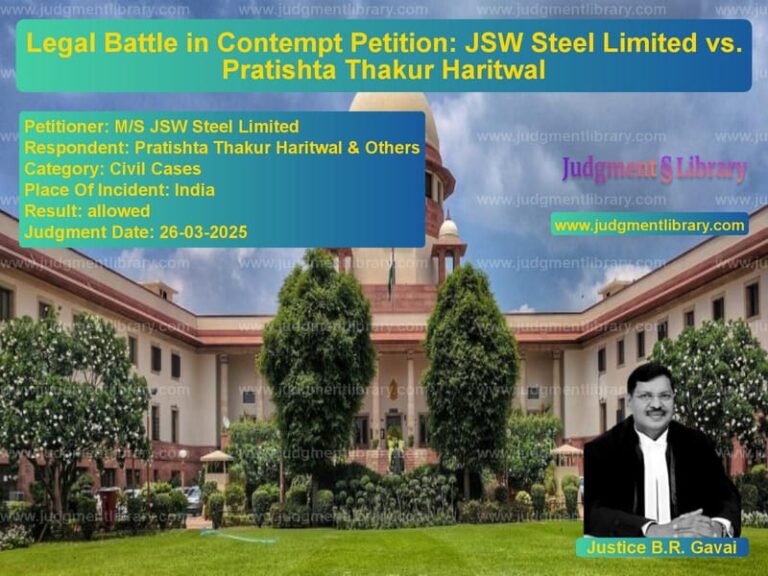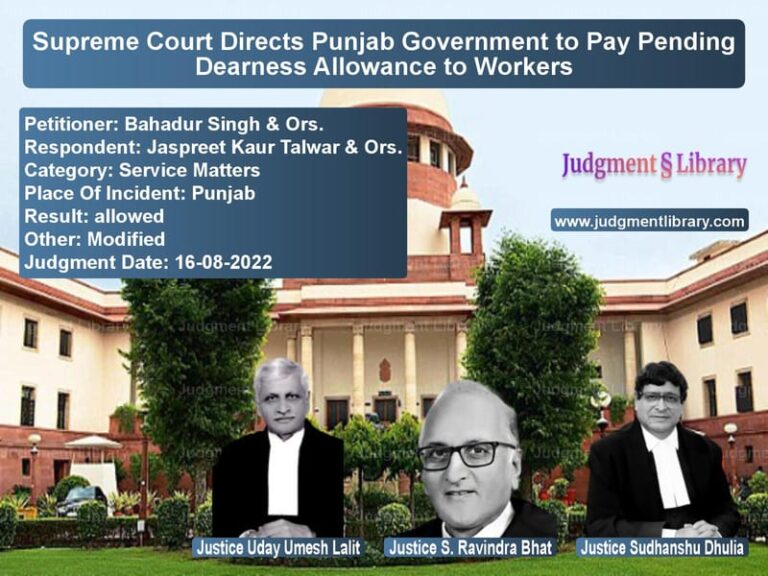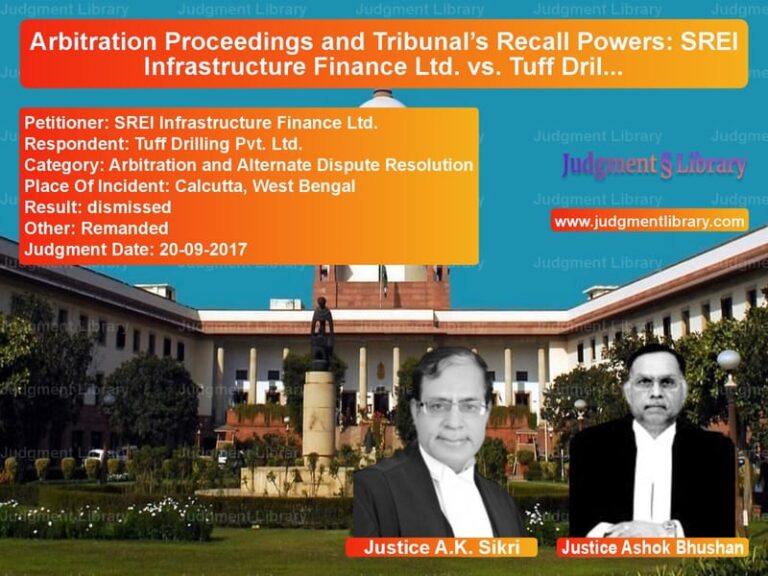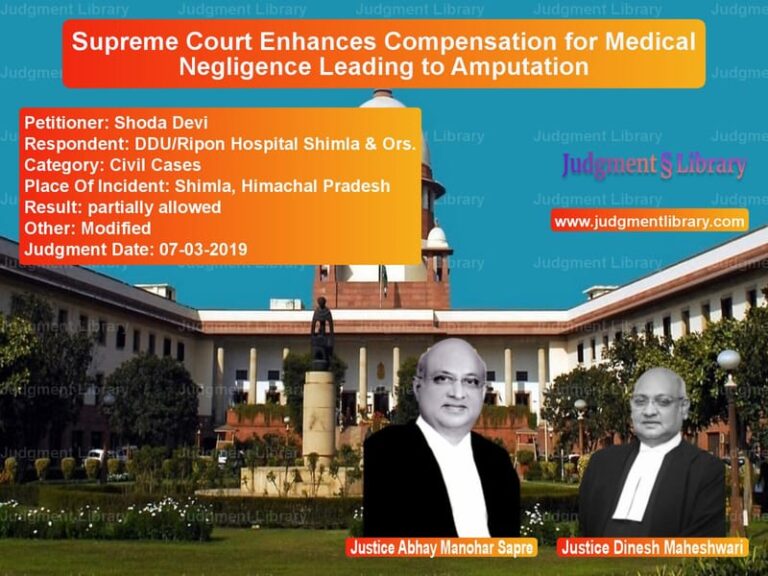Motor Accident Compensation Case: Supreme Court Enhances Award for Deceased Homemaker
The case of S. Chandrasekharan & Ors. vs. M. Dinakar & Anr. revolves around a tragic motor accident that occurred on February 28, 2011, in Chennai. The accident resulted in the death of Bala Babitha, a 37-year-old homemaker, and caused injuries to her husband and minor daughter. The Supreme Court was tasked with determining the rightful compensation for the deceased’s family after the High Court had reduced the amount initially awarded by the Motor Accident Claims Tribunal.
Background of the Case
On the fateful day, Bala Babitha was traveling in an auto-rickshaw with her husband and daughter when a vehicle (registration number TN-04-W-6189) crashed into them. The vehicle’s owner was the first respondent, and the second respondent was the insurance company covering the vehicle.
Read also: https://judgmentlibrary.com/motor-accident-compensation-supreme-court-restores-tribunal-award/
The deceased’s family, including her husband (first appellant), two minor children (second and third appellants), and her mother (fourth appellant), filed a compensation claim under Section 166 of the Motor Vehicles Act, 1988, before the Motor Accident Claims Tribunal (MACT) in Chennai.
Compensation Awarded by the Tribunal
The MACT ruled in favor of the appellants and awarded the following compensation:
- Pecuniary loss: Rs. 31,50,000
- Loss of consortium: Rs. 1,00,000
- Funeral expenses: Rs. 25,000
- Loss of love and affection: Rs. 4,00,000
- Medical expenses: Rs. 17,350
- Total compensation: Rs. 36,92,350
The awarded compensation carried an interest rate of 7.5% per annum from the date of filing until the deposit.
High Court’s Modifications
Both the insurance company and the appellants appealed against the MACT ruling. The High Court revised the compensation as follows:
- Pecuniary loss: Rs. 30,94,740
- Loss of consortium: Rs. 40,000
- Funeral expenses: Rs. 15,000
- Loss of love and affection: Rs. 1,00,000
- Loss of estate: Rs. 15,000
- Medical expenses: Rs. 17,350
- Total compensation: Rs. 32,82,090
The High Court deviated from the Tribunal’s computation method and used the deceased’s salary from three years prior to the accident as the basis for calculating compensation, which led to a reduction in the overall compensation.
Key Legal Issue
The central issue before the Supreme Court was whether the pecuniary loss should be computed based on the deceased’s past salary or the income of her surviving husband, given that she was a homemaker at the time of the accident.
Arguments Presented
Appellants’ Arguments:
- The appellants contended that the High Court erred in considering the deceased’s past salary from three years before the accident instead of relying on the method prescribed in Arun Kumar Agrawal vs. National Insurance Company Ltd. [(2010) 9 SCC 218], which allows compensation to be calculated as one-third of the surviving spouse’s income.
- The deceased’s role as a homemaker was invaluable, and its contribution should not be underestimated in financial terms.
- The MACT correctly applied the multiplier method and considered the loss of care and services rendered by the deceased to her family.
Respondents’ Arguments:
- The insurance company argued that the appellants could not change their stance before the Supreme Court, as they had previously based their claim on the deceased’s past salary.
- The compensation should be based on the last drawn salary of the deceased, as considered by the High Court.
- The High Court correctly deducted 50% towards personal expenses since the deceased was not earning at the time of the accident.
Supreme Court’s Observations and Ruling
The Supreme Court ruled in favor of the appellants, holding that the High Court had committed two fundamental errors:
- Since the deceased was unemployed at the time of her death, her last drawn salary from three years prior was not a reliable metric for compensation.
- The High Court’s deduction of 50% towards personal expenses was incorrect, as the deceased had two dependent minor children.
The Court reinstated the MACT’s method of calculating pecuniary loss based on the surviving spouse’s income, citing Arun Kumar Agrawal as the appropriate precedent.
The revised compensation figures determined by the Supreme Court were:
- Pecuniary loss (including future prospects): Rs. 44,10,000
- Loss of consortium: Rs. 1,60,000 (Rs. 40,000 for each appellant)
- Funeral expenses: Rs. 15,000
- Loss of estate: Rs. 15,000
- Medical expenses: Rs. 17,350
- Total compensation: Rs. 46,17,350
Key Judicial Excerpts:
The Supreme Court emphasized:
“It is highly unfair, unjust, and inappropriate to compute the compensation payable to the dependents of a deceased wife/mother, who does not have a regular income, by comparing her services with that of a housekeeper or a servant. The gratuitous services rendered by the wife/mother to the husband and children cannot be equated with the services of an employee.”
“The Tribunal had rightly followed the course laid down in the case of Arun Kumar Agrawal, which in the given facts, constituted a more definitive and reliable methodology for quantifying pecuniary loss.”
The Court also adjusted the distribution of compensation, increasing the amount allocated to the deceased’s mother from Rs. 1,00,000 to Rs. 2,00,000.
Conclusion
The Supreme Court’s decision reinforces the principle that homemakers’ contributions must be financially acknowledged when awarding compensation for accidental deaths. It corrects the High Court’s error in undervaluing the deceased’s role and provides a more equitable outcome for the dependents.
Petitioner Name: S. Chandrasekharan & Ors..Respondent Name: M. Dinakar & Anr..Judgment By: Justice Dinesh Maheshwari, Justice Aniruddha Bose.Place Of Incident: Chennai.Judgment Date: 11-07-2022.
Don’t miss out on the full details! Download the complete judgment in PDF format below and gain valuable insights instantly!
Download Judgment: s.-chandrasekharan-&-vs-m.-dinakar-&-anr.-supreme-court-of-india-judgment-dated-11-07-2022.pdf
Directly Download Judgment: Directly download this Judgment
See all petitions in Compensation Disputes
See all petitions in Motor Vehicle Act
See all petitions in Negligence Claims
See all petitions in Judgment by Dinesh Maheshwari
See all petitions in Judgment by Aniruddha Bose
See all petitions in allowed
See all petitions in Modified
See all petitions in supreme court of India judgments July 2022
See all petitions in 2022 judgments
See all posts in Accident Cases Category
See all allowed petitions in Accident Cases Category
See all Dismissed petitions in Accident Cases Category
See all partially allowed petitions in Accident Cases Category







